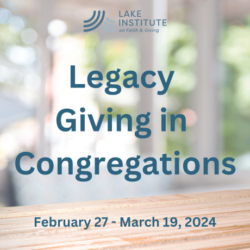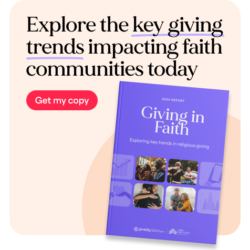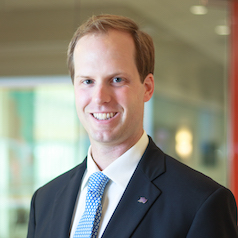We Can Talk About Hard Things
We Can Talk About Hard Things
by Meredith McNabb
If, as they say, the only things certain in life are death and taxes, they’re also certainly pretty daunting topics to bring up in conversation for many of us—and both come up front and center when we start to approach the topic of legacy gifts. At a recent gathering of newer fundraisers working at secular nonprofits and developing their knowledge and skills around planned giving, the group seemed quite comfortable wrestling with taxes. Death was a different story: there was a lot of nervous laughter when we’d come close to the topic—and neither the participants nor the leaders could even bring themselves to say the word “death” at first! But religious leaders have lots of experience talking about the hard things in people’s lives, including questions of life and death, and legacy giving is too important to leave out of those important conversations, even if it feels like a challenge to approach the topic.
Holding Space
Participants in religious congregations and donors and friends of religious nonprofit organizations are going to be all over the map in their own comfort with talking about death and legacy. It’s wise practice to take a cue from them about the language that will be most comfortable for them when speaking about end-of-life concerns, but the ability to hold space for important matters even in the midst of discomfort is one of the best gifts religious leaders can give. No matter the exact language, there will likely be a common thread of too much silence on the topic.
As theologian and professor Tom Long puts it, quoting Robin Marantz Henig in the New York Times,
Most of us will be old and sick when we die and will have had years to tell our loved ones just what it is about dying that most frightens us and, in broad brush strokes, just how we hope to die. The trouble is, most of us aren’t talking. The silence is another example of our ambivalence about death, our unwillingness to look it straight in the face even as we make noises about accepting it.” [Long adds,] “How can we interrupt this silence?”¹
Especially for those in congregational settings, bringing up questions of life and death and offering the teachings and values of one’s tradition as a normal part of what can be discussed can go a long way toward opening the door to conversation. In a death-denying culture, leaders in any religious setting can help reduce the taboo and let people engage with their own experiences, questions, and tradition.
Transforming the Conversation
Developing legacy giving is a chance to interrupt the silence about death and transform the conversation about end-of-life concerns more broadly. It’s not a conversation that should be limited only to those with significant financial assets, nor only to more senior individuals, and certainly not limited only to when the congregation or organization has a big capital project in mind. “Legacy” is a topic that crosses faith traditions, financial capacities, and generational boundaries. Being able to have thoughtful conversations about providing for loved ones after one’s death can be absolutely transformative for individuals and families who may not have considered the importance of doing end-of-life planning, or who haven’t known how to get started. Only 46% of Americans have a will, according to Gallup, and many don’t know the importance of making basic estate plans even for those of modest means or middle age.
Expanding the conversation about legacy giving also offers a way to think about death in terms of impact and meaning, in addition to more tender considerations of loss or grief. For many individuals, gifts at death might be the largest gifts they can make: what an opportunity to express one’s values and to support individuals, organizations, and causes one believes in! “How would you hope to be remembered by your family and friends?” is a powerful discussion-deepener that invites a whole different range of reflection.
What about the Technicalities?
Not many religious leaders are going to be competent and comfortable with the intricacies of complex planned gifts, but that’s not the role that’s called for! Those would-be legacy givers who are interested in tax-savvy sophisticated planned giving instruments will almost certainly have financial and legal advisers who can help them set up their desired charitable remainder trusts and the like. Two key areas do require the religious leader’s focus, however:
Leading the congregation or religious organization to be ready and worthy to receive legacy gifts
One would hope that many legacy givers will be among the living for many years, if not decades, before their planned gifts come to fruition, but that means that most legacy gifts will not be designated for active campaigns or initiatives. What values, mission, and vision can both the donor and the congregation or organization be confident will carry on 10, 20, even 30 years into the future? Thoughtful gift acceptance policies and encouragement for flexible designations for the gifts will be important to ensure that future gifts will be effective in a future that’s not yet known.
Discernment about the congregation or religious organization’s capacity to develop a legacy giving program
Legacy gifts are deeply rooted in trust, and the givers who plan to make them need to be cared for and kept informed along the way. If the congregation or organization has had breaches of trust or deep conflict, those are aspects of reconciliation and healing that will need to be addressed before a legacy giving effort can fully thrive. Even where trust is strong, leaders will need to keep nurturing it—making clear that a legacy giver’s value to the congregation or organization is not primarily in their death!
Clergy and the leaders of religiously affiliated nonprofits can broach the tender conversations that may come around legacy giving with confidence and sensitivity, and for the wellbeing of their constituents and their organizations, they should brave the topic early and often. While gifts, even quite significant gifts, may come to the organization out of those conversations, even greater gifts of being able to grapple with life and death will emerge for the people involved.
¹Thomas G. Long, Accompany Them With Singing: The Christian Funeral Louisville: Westminster John Knox Press, 2009, page 112.
Questions for Reflection
- What does “holding space” for hard conversations look like in the work you do?
- What are some natural ways to “interrupt the silence” and broach tough topics in your setting?
Expanded Perspective: Planned Giving
I recall being a young pastor and preparing sermons whose Scriptural references lent themselves to deep theological exposition. These were sermons that had room for a deep dive on the nature of God, the atonement, or other topics that required that I return to class notes from seminary and large books on systematic theology. I remember feeling the weight of needing to explain everything I knew about the topic and to fit years’ worth of education into just a few minutes of a sermon.
Maybe others recall this feeling…and the wisdom that eventually comes to us all when we realize it’s not our responsibility to share everything there is to know about a topic and that’s probably not what our congregation wants to hear anyway.
What’s more helpful (and frankly, more enjoyable to listen to) is a message that shares enough information to help congregation members grow in knowledge and understanding, but only goes so far as to confidently lead them to the next step. The outcome is to ask them a new question or two or leave them with a few new insights that are relevant to their own lives that day.
As I’ve grown in my experience as a fundraiser, I’ve come to view my role in having planned giving conversations much the same way. Maybe you already have a wealth of knowledge about establishing lead trusts or the tax implications of charitable gift annuities. Maybe you don’t. In the end, that’s not the point. Most often, our responsibility is to simply get the conversation going, to introduce some basic concepts, to discuss the deeper meaning of these philanthropic decisions, and to help lead them to the next step in a way that is relevant to them.
Thankfully, we don’t have to know everything to be helpful in discussing planned giving options, or any potentially complex philanthropic idea. Instead, as faith leaders, we can confidently rely on what we do best, which is to bring a depth of meaning to difficult topics, and to open the door to conversations about matters that outlast all of us. That’s often all they need to hear.
Rev. Dr. McKennon Shea is the Vice President of Development for High Point University in High Point, North Carolina. He holds a Master’s in Divinity from Duke University and a Doctor of Education from the University of Pennsylvania. McKennon is a United Methodist pastor and is co-facilitating the Legacy Giving short course this spring.
Legacy Giving in Congregations
 We are pleased to share that we have a new online, short course coming in late February. Developing Legacy Giving in Congregations will help course participants develop the understanding and practical skills to launch or enhance a legacy giving program for their congregation. The class will meet 90 minutes once a week beginning February 27 and concluding March 19. There is a discount for ECRF alumni! Learn more and register today.
We are pleased to share that we have a new online, short course coming in late February. Developing Legacy Giving in Congregations will help course participants develop the understanding and practical skills to launch or enhance a legacy giving program for their congregation. The class will meet 90 minutes once a week beginning February 27 and concluding March 19. There is a discount for ECRF alumni! Learn more and register today.
Register today
New: 2024 Giving in Faith Report
 We’re pleased to share Givelify’s third Giving in Faith report, developed by Givelify’s Philanthropic Data & Insights team in collaboration with Lake Institute. Based on the responses of nearly 3,000 faith leaders and people of faith, this report uncovers key insights into the motivations and community needs driving religious giving and an outlook on future giving. It also explores the impacts emerging technologies like artificial intelligence (AI) and language models like ChatGPT are having on congregations and the innovative ways faith leaders are using these tools.
We’re pleased to share Givelify’s third Giving in Faith report, developed by Givelify’s Philanthropic Data & Insights team in collaboration with Lake Institute. Based on the responses of nearly 3,000 faith leaders and people of faith, this report uncovers key insights into the motivations and community needs driving religious giving and an outlook on future giving. It also explores the impacts emerging technologies like artificial intelligence (AI) and language models like ChatGPT are having on congregations and the innovative ways faith leaders are using these tools.
Explore these exclusive insights. Download your free copy of the 2024 report today.
Subscribe
Insights is a bi-weekly e-newsletter for the religious community and fundraisers of faith-based organizations that provides:
- Reflections on important developments in the field of faith and giving
- Recommended books, studies and articles
- Upcoming Lake Institute events


